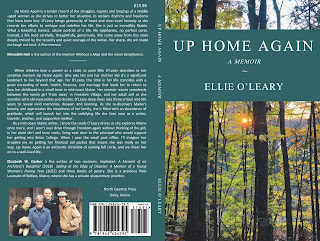Free Verse
How do you start a poem? You, right here, reading this? Do you wake up with a line in your head? Are you musing about something you saw on your walk this morning? Are you remembering something and now want to write about it? Pick a topic or a line and start writing a poem. We’ll start with free verse.
In the anthology Staying Alive
edited by Neil Astley, he writes in an appendix “The Sound of Poetry” that “The
essence of poetry has always been rhythm - NOT rhyme – and in many
languages rhyme is not used at all.”
What makes it poetry then? Rhythm,
imagery, metaphor to name a few things. In free verse there is no appearance of
classic poetry. No rhymes or counting syllables required, but it is poetry.
“Free verse is just that – lines of
poetry that are written without rules: no regular beat and no rhyme. . . . The point of free verse is not that it
has thrown the traditional rules of poetry out of the window; rather, it
requires that every poet who writes in this form must create his or her own
rules.” Padgett in Handbook of Forms.
Here is an example of free verse from
one of America’s earliest and most famous poets of this form – Walt Whitman.
I Hear
America Singing
I Hear
America singing, the varied carols I hear;
Those of mechanics--each one singing his, as it should be, blithe and strong;
The carpenter singing his, as he measures his plank or beam,
The mason singing his, as he makes ready for work, or leaves off work;
The boatman singing what belongs to him in his boat--the deckhand singing on
the steamboat deck;
The shoemaker singing as he sits on his bench--the hatter singing as he stands;
The wood-cutter's song--the ploughboy's, on his way in the morning, or at the
noon intermission, or at sundown;
The delicious singing of the mother--or of the young wife at work--or of the
girl sewing or washing--Each singing what belongs to her, and to none else;
The day what belongs to the day--At night, the party of young fellows, robust,
friendly,
Singing, with open mouths, their strong melodious songs.

A Poet’s Glossary by Edward Hirsch
ReplyDeleteHandbook of Poetic Forms by Ron Padgett
The Making of a Poem: A Norton Anthology of Poetic Forms by Mark Strand and Eavan Boland, eds
Staying Alive: Real Poems for Unreal Times by Neil Astley